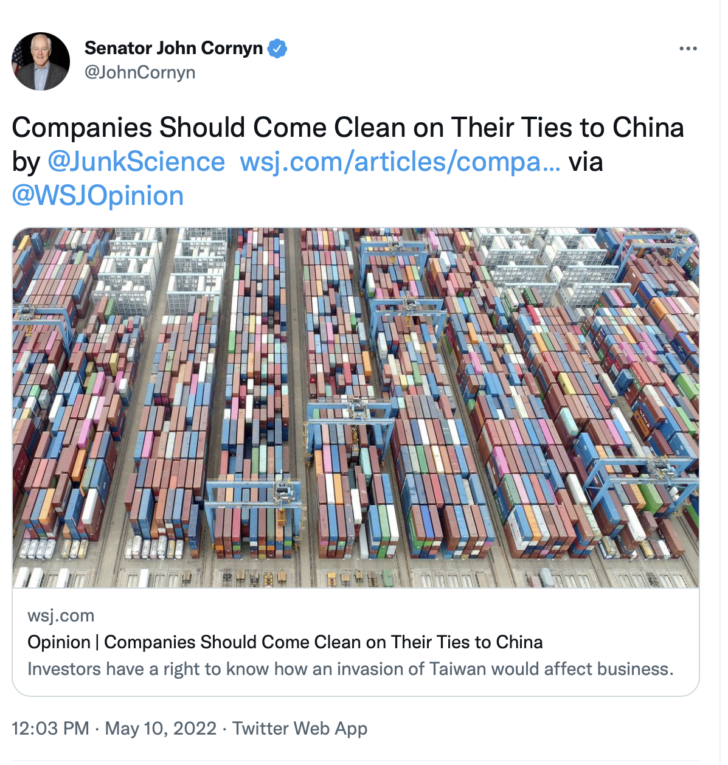My latest in the Wall Street Journal (Web|PDF).

The Securities and Exchange Commission is prodding publicly owned companies to disclose how Russia’s invasion of Ukraine is affecting their operations. BP, Shell and Exxon Mobil have booked charges of $25.5 billion, $8.4 billion and $3.4 billion respectively, but the major oil companies aren’t the only ones losing money. General Electric took a $200 million charge, and McDonald’s is losing $50 million a month from closing its Russian operations. Netflix suspended service in Russia and lost 700,000 viewers, the first time in a decade its viewership has declined.
All this is peanuts compared with what might lie ahead should China attempt to invade Taiwan. Trade between the U.S. and China was worth $615 billion in 2020, according to the Office of the U.S. Trade Representative. In contrast, U.S.-Russia trade was only worth about $35 billion in 2019. But that disparity in trade volume is only the tip of the iceberg. The stuff we get from China—from antibiotics and smartphones to minerals and metals needed for green technology—is much more important than almost anything we get from Russia. The Biden administration wants to commit the U.S. to a green agenda, but 80% of the rare-earth minerals needed for that technology are processed by China.
China is a well-known serial violator of human and civil rights whose leaders say they intend to displace the U.S. as the lone global superpower by 2049. The U.S. has a longstanding commitment to defend Taiwan, which China may attempt to seize by force. U.S.-China relations are tense over issues including China’s military expansion, actions related to Covid, intellectual-property theft, tariffs and solar-panel dumping.
China has also publicly indicated that it would use its industrial capabilities, such as rare-earth mineral processing, for strategic purposes against adversaries. Beijing recently levied large tariffs on imported Australian goods in retaliation for Canberra’s attempts to investigate the origin of the Covid-19 pandemic.
The good news is the SEC staff has recently given the green light to my shareholder proposal for a “Communist China Audit,” which asks companies to disclose to shareholders the extent to which their business relies on China. This year, I filed this proposal with 3M and Verizon. The former has substantial business operations in China—more than 6% of 3M’s workforce is based there. At the beginning of the pandemic, 3M had to secure Beijing’s permission to export Chinese-made N95 masks to the U.S.
Verizon doesn’t itself have significant operations in China, but it would materially affect its business if China stopped exporting smartphones and other technology to the U.S. As many as 70% of all smartphones shipped to the U.S. come from China. Verizon’s leadership asked the SEC staff to exclude my proposal, but the request was denied.
Shareholders have the right to know the extent to which their investments depend on U.S.-China relations. The Russian invasion of Ukraine, along with the growing closeness between Moscow and Beijing, has increased the possibility of a dangerous U.S.-China confrontation. The 3M and Verizon shareholder proposals will be voted on May 10 and 12, respectively. But the time for all companies to prepare and to make adequate disclosures of material information regarding China is now.
Mr. Milloy is a senior legal fellow with the Energy and Environmental Legal Institute and a former SEC attorney and investment-fund manager.
Update:
